
by Julia Felton | Aug 14, 2019
For many years trust has been considered a “soft” corporate issue, in part because it has been so difficult to measure. Whilst intuitively leaders knew that the level of trust in the organisation impacted team performance and company value, there was no concrete evidence to support this. However, new research by Accenture has quantified the impact of trust on a company’s competitiveness. And the bottom line is that trust is anything but soft.
What is trust?
Accenture Strategy defines trust as “a consistent experience of competence, integrity, honesty, transparency, commitment, purpose and familiarity.” Trust acts as a lubricant that helps oil a company’s relationships with its stakeholders and, in doing so, builds shared value for the business. When there is an actual or perceived breach of trust then the impact on the business can be catastrophic. Remember the impact that the Enron scandal had on its accountants Arthur Andersen. Whilst eventually Arthur Andersen was exonerated from any wrongdoing, it was not before the company imploded, as clients left in droves not wanting to be associated with a business that was perceived to have been complicit in the demise of Enron.
Technology, social media, and the digital economy have resulted in trust incidents becoming increasingly visible to the general public. This heightened transparency means trust is a highly flammable, ever-present concern for business leaders. No longer can leaders assume that breaches of trust can be dealt with by great PR interventions. Instead, business leaders need to intentionally create a culture that builds, maintains, and preserves trust.
Trust needs to become baked into the DNA, strategy, and day-to-day operations of all aspects of business because it impacts relationships with all the business stakeholders.
Customers
Increasingly, customers have more choices than ever before and are selecting providers based on values alignment. Customer satisfaction occurs when a companies products and services live up to brand promise thereby improving reputational value and trust. Companies that cannot deliver on brand promise or transparency will lose customer trust and, consequently, business.
A recent Accenture Strategy study of 25,000 global consumers found that, of customers who switched companies in the past year, 46 percent did so because they lost trust in the company. And switching isn’t the total cost. Customers are willing to speak up, organize, and boycott when their expectations aren’t met.
Employees
In the war for talent, a company’s reputation and actions become more important to job seekers. Accenture Strategy research revealed that more than one-third of workers surveyed ranked reputation as a top-three motivation to work for their current employer.
Suppliers and trusted partners
Key players in today’s business value chain are suppliers and trusted partners as they enable faster innovation cycles with more flexibility. The recent Accenture Strategy research points out that 84 percent of supply chain executives say they will increasingly use distributed manufacturing networks (more third parties) to meet customer demands.
Media
The advent of social media has meant that the opinions of the general public play out in real time across all forms of media. This has can have both positive and negative impacts on building trust, and also provide a forum whereby negative trust breaches can be acknowledged and rectified.
Analysts and Investors
Increasingly, analysts and investors are not just interested in the financial metrics of a business, but also in the reputation, social impact, sustainability, and employee engagement. A joint report developed with the United Nations Global Compact found that 88 percent of investors see sustainability as a route to competitive advantage.
With trust impacting so many aspects of a business, it is essential that leaders focus on how to build trust and embed a trust into the organizational culture. They need to that ensure that all the companies behaviors and actions match the company stated values in the eyes of all major stakeholders. This means ensuring that there is alignment throughout the organisation and everyone is pulling together in the same direction.
The consequence of leaders not focusing on developing a trust-based culture within the organisation is that it can significantly negatively influence the bottom line and competitiveness in the marketplace.
Julia Felton (aka The Business Wrangler) is the founder of Business HorsePower. Business leaders, entrepreneurs and executives hire her to accelerate their business performance by harnessing the energy of their people to work more collaboratively together. By aligning purpose with actions the team achieves exponential results as everyone starts pulling in the same direction.
Julia believes that business is a force for good and through designing purpose-driven businesses that leverage the laws of nature, and the herd, you can create businesses founded on the principles of connection, collaboration and community that make a significant impact in the world.
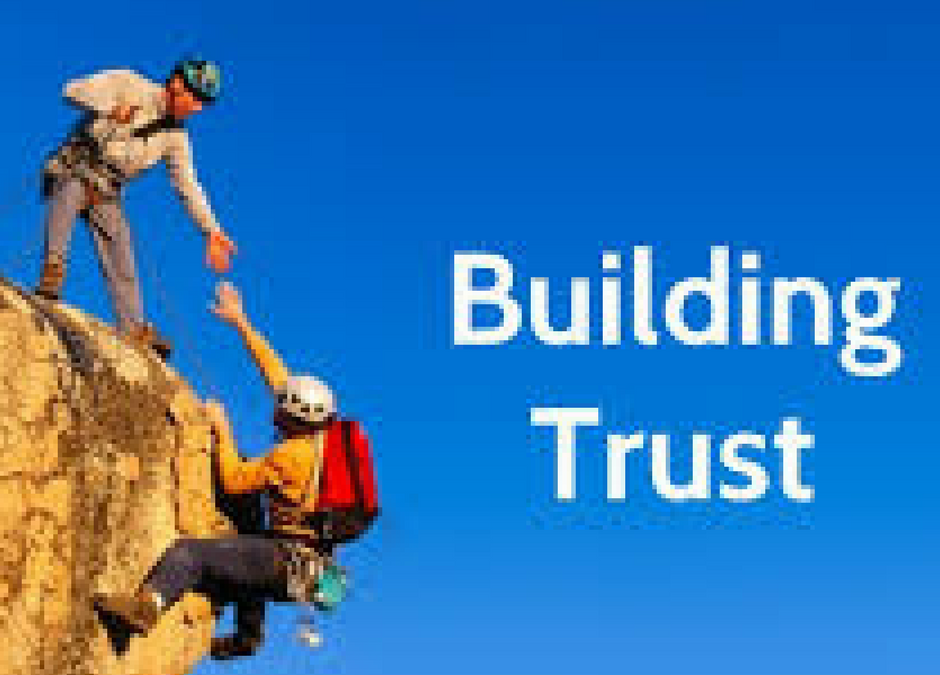
by Julia Felton | Feb 28, 2018
“Make trust an integral part of your professional relationships—or kiss success goodbye”.
Recently I ran a workshop all about the art of communication and how only by communicating effectively can you seek to build great relationships. These relationship, whether in your personal or work life, are essential if you are to succeed. How often have you seen a potential client purchase from someone else even though you had a better product or could offer a better service? I see this all the time and the reason it happens is that people buy people. We trust people that we have formed rapport with and with whom we have a great connection.
And it was no different on our workshop. The delegates experienced the most success when they were able to drop into horse-time and really spend time connecting with the horses. From this place of deep connection trust built which eventually led to them developing a magical partnership. A true win-win situation where the horses walked freely around the arena with my clients, with no ropes or constraints. So why did they walk with the client out of their own free will? Because they trusted my clients and felt safe. There was the right mix of trust and respect in the relationship which meant that both parties showed up fully present and were engaged in having a meaningful connection.
The insights for our clients was immense as they fully experienced, often for the first time, how true connection really feels and how it impacts each party. How it is reliant on a combination of trust and respect and how when you have have great connection the horse (or a potential client) will want to be with you and follow you. No more sales conversations required! How engagement for both parties improves when trust is present.
Trust is everything, especially if you are leading another person, a team or a company toward a shared goal or mission. Without a credible reputation, your followers will be hesitant, uncomfortable and unsure of whom they’re really following. And that insecurity, that lack of confidence, can crumble the loyalty and united support that’s vital in an organisation’s success.
So how do you become trustworthy? Remember, good intentions are just the beginning. Here are 15 ways to build and strengthen your credibility as a leader, adapted from Follow Your Conscience by Frank Sonnenberg, author of Marketing to Win and Managing with a Conscience.
1. Show people that you care about their needs.
2. A promise should be as binding as a contract.
3. Never sacrifice a long-term relationship for a short-term gain.
4. Don’t expect people to look up to you if you look down on them.
5. Give credit where credit is due.
6. The danger of shooting from the hip is hitting yourself in the foot.
7. Take the time to provide the rationale behind your recommendations.
8. Be objective.
9. Stand up for the things that you believe in. (Waffles are for breakfast.)
10. Never ask someone to do something that you’re unwilling to do yourself.
11. Your actions must match your words.
12. Think before you open your mouth.
13. You gain more by making others look good than by singing your own praises.
14. Words spoken in confidence are words spoken in trust.
15. Few people will fault you for being tough, if you’re fair.
So what are you doing to build trust and create deep, meaningful relationships? How are you staying connected to your tribe? What are you giving to the relationship with no expectation of return? What can you do to build better relationships and connection today?
Your investment in building relationships will repay itself 10x over, if you just invest the time and energy to truly connect.
Julia Felton (aka The Business Wrangler) is the founder of Business HorsePower. Business leaders, entrepreneurs and executives hire her to accelerate their business performance by harnessing the energy of their people to work more collaboratively together. By aligning purpose with actions the team achieves exponential results as everyone starts pulling in the same direction.
Julia believes that business is a force for good and through designing purpose-driven businesses that leverage the laws of nature, and the herd, you can create businesses founded on the principles of connection, collaboration and community that make a significant impact in the world.
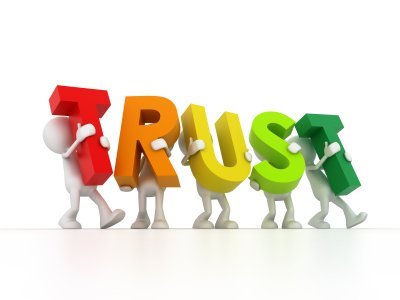
by Julia Felton | Feb 21, 2018
Trust needs to be reciprocal and shared. We don’t trust rules, we trust people. Courage comes from leaders whose responsibility it is to protect the people working below them. People have confidence to do the right thing when they feel trusted by their leaders. It is leaders who energise the business culture to enable team members to reach their full potential, resulting in superior business performance.
Leaders cannot break trust with people and continue to influence them; it simply does not happen. Once trust is lost and the leaders influence is destroyed then team performance dwindles. Once this occurs sales are impacted as people buy from people they know, like and trust. Without trust, the organisation loses productivity, relationships, talent, customer loyalty, creativity, morale, revenue and results. This is why trust, not money, is the currency of business.
“Trust is like a mirror … once its BROKEN you can never look at it the same again…”Unknown
Lack of trust is prevalent in business today. Team members no longer trust employers to look after them. Long gone are the days when people had a job for life. Today businesses quickly downsize when economic conditions get tough. There is little loyalty from team members to employers or vice versa. The financial crisis of 2008/9 has made more and more people distrustful of banking institutions, as well as the government’s ability to handle these situations.
The diagram below clearly illustrates the consequences and impact of high versus low trust in a business:
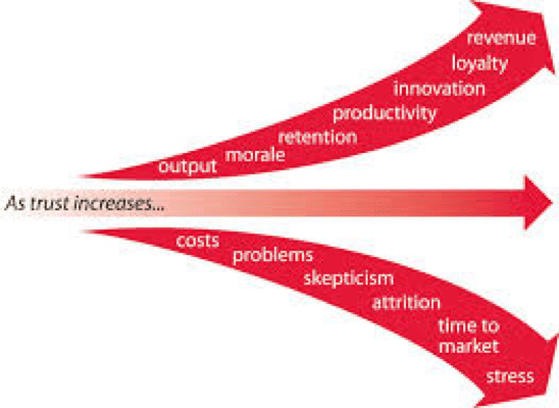
To earn the trust of their team members, leaders must first care for their well-being and connect with them. To earn trust, trust must be extended. The best way to do this is to create a caring environment that enables people to fully engage their heads and hearts.
High Trust Environments Are Life Changing
In the VUCA world in which we now live there is only one certainty and that is change. Change is forged through relationships and the foundation of effective relationships is trust. During change trust will be tested at best and broken at worst which is why high trust relationships are essential to your change effort’s success. When you are the people you work with trust one another, you have one another’s backs as change unfolds. Instead of keeping your head down, you keep an eye on where you can step in and offer extra support. Instead of allowing change to unravel your relationships, you leverage change to strengthen your relationships.
The result is that everyone pulls together in the same direction and no-one is left behind. Communication and engagement improve as team members start asking how they can best contribute and support the change. How can they make a real difference? When the leader and team members are aligned in the right place, contributing to the right work with the right people then team members feel valued and become more highly engaged. Which only has positive benefits for the organisation as productivity and profitability increase.
“Increasing employee engagement by 10% can increase profits by US$2,400 per employee per year”. Accenture
if you’d like to learn how to increase trust and employee engagement in your organisation then please reach out to me for a conversation.
Julia Felton (aka The Business Wrangler) is the founder of Business HorsePower. Business leaders, entrepreneurs and executives hire her to accelerate their business performance by harnessing the energy of their people to work more collaboratively together. By aligning purpose with actions the team achieves exponential results as everyone starts pulling in the same direction.
Julia believes that business is a force for good and through designing purpose-driven businesses that leverage the laws of nature, and the herd, you can create businesses founded on the principles of connection, collaboration and community that make a significant impact in the world.
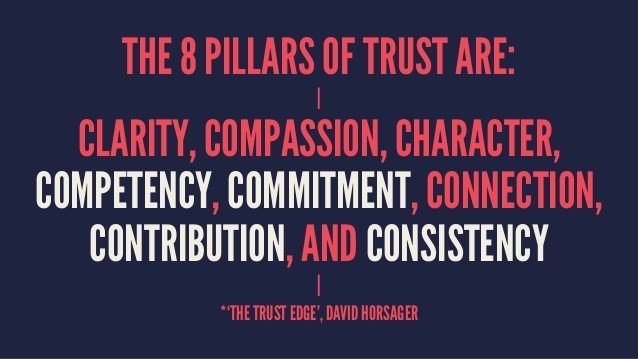
by Julia Felton | Feb 14, 2018
So how do we build trust in organisations?. What actions can leaders take to create a trust based culture where team members feel fulfilled and give of their best of each and everyday? .
In the book the Trust Edge, eight pillars of trust are identified that when used together help individuals and therefore organisations to become more trustworthy. These are:
1. Clarity
People trust the clear and mistrust the ambiguous. Clarity unifies and motivates, it increases morale and inspires trust. Clear communication leads to trusted colleagues, happy team members and satisfied customers.
2. Compassion
People put faith in those that care beyond themselves. Caring leads to trust. Great leaders think beyond themselves and put people before thongs to improve relationships.
3. Character
People notice those who do what is right over what is easy. Building integrity tales work but also yields the biggest rewards. Great leaders always ask: “Is this the right thing?”
4. Competency
People have confidence in leaders who stay up-to-date with relevant new ideas and concepts. As a leader make sure to continually stretch your mind to discover new ideas, fresh thoughts and concepts. Engage in continual learning and surround yourself with inspiring and motivating people, who challenge you
5. Commitment
Passion is the essential ingredient of commitment. When people are committed to a cause they will go out of their way to make things happen. People who stick with you when times are tough are those that you can trust.
6. Connection
People want to follow, buy from and be around people they like and trust. As a leader ensure you engage and collaborate with team members and customers and really listen to what they need.
7. Contribution
People respond to results. Give your attention, resources, time, opportunity and talent to make a difference. As a leader you must deliver results in order to be credible and be trusted.
8. Consistency
People love to see the little things done consistently. It gives them security and comfort. Trust is built over time so ensure the same quality of results is delivered every time to build trust.
When these eight pillars are implemented in organisations then leaders enjoy improved relationships, reputation, retention, revenue and results. Which of these trust pillars will you start implementing in your organisation today? What will be the impact on your ability to navigate change if you increase trust levels by just a few percentage points.
From my experience the most highly trusted organisations thrive as they enjoy higher levels of team engagement, morale productivity and innovation, all factors which enable the business to be agile and respond on-the-hoof to changing business situations.
Julia Felton (aka The Business Wrangler) is the founder of Business HorsePower. Business leaders, entrepreneurs and executives hire her to accelerate their business performance by harnessing the energy of their people to work more collaboratively together. By aligning purpose with actions the team achieves exponential results as everyone starts pulling in the same direction.
Julia believes that business is a force for good and through designing purpose-driven businesses that leverage the laws of nature, and the herd, you can create businesses founded on the principles of connection, collaboration and community that make a significant impact in the world.
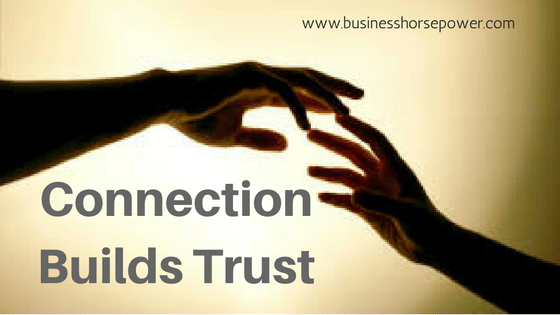
by Julia Felton | Dec 21, 2016
As Christmas fast approaches I got to thinking about my family and how good (or not as the case maybe) we are at connecting and communicating. Connecting and communicating with others is a vital piece of business and life. It allows you to find the common ground with each other and so share experiences at a deeper level. The better you understand how someone else thinks and why they act in the way that they do, the easier it is get along with them and have meaningful conversations that can grow your business and you life
Of course, there is a paradox here because as your connection grows so does your trust, and yet trust is often needed before the connection can start. This is the dance of the connection – trust equation which was illustrated so brilliantly by the horses last week.
My VIP clients had flown in from Amsterdam for their annual business planning session with the horses. Every year they come to grow as leaders and get insights into their business goals for the following year. This year was no exception, except being their third visit they said that the learning’s and insights were even more profound than last year. It has been a privilege to watch them develop over the years.
Next year, they are proposing a new business model, one where they will be focusing on very high end packages which deliver deep transformation for their clients. However, in order to deliver these packages they need to step up their leadership skills. Specifically they needed to learn how to stay deeply connected to their clients, whilst also being “unavailable”, yet highly trustworthy.
Coach Toby demonstrated so amazing this conundrum because when my client went to connect with him, he walked away. He simply did not trust her enough to feel confident to connect with him. My client had to spend a lot of time building his trust by showing up as a consistent leader, who had clarity and certainty whilst also respecting his boundaries and the space he needed.
And so started the dance, with my client approaching and retreating. Giving Toby the space he needed so that he could feel comfortable with her and connect on his terms. It took some time but the results were incredible. Once he felt he trusted her, and she respected him, he was open to connect and the more he connected the deeper the trust grew between them. It was magical to watch. The end result was that she led him effortlessly through a complex obstacle course in a harmonious manner easily achieving her business goals for 2017.
And her takeaway was that as she launches her new programmes she must not rush her clients into them. Rather she needs to spend time building trust with her clients so that their relationship deepens and a lasting connection forms. From this space her clients will want to go on the journey with her just as Toby wanted to go through the obstacle course with her.
So over the Holiday Season please spend some time focusing on how you can build trust and connection with your family and friends. The results will amaze you.
Wishing you a very Happy Christmas and New Year.
Julia Felton (aka The Business Wrangler) is the founder of Business HorsePower. Business leaders, entrepreneurs and executives hire her to accelerate their business performance by harnessing the energy of their people to work more collaboratively together. By aligning purpose with actions the team achieves exponential results as everyone starts pulling in the same direction.
Julia believes that business is a force for good and through designing purpose-driven businesses that leverage the laws of nature, and the herd, you can create businesses founded on the principles of connection, collaboration and community that make a significant impact in the world.
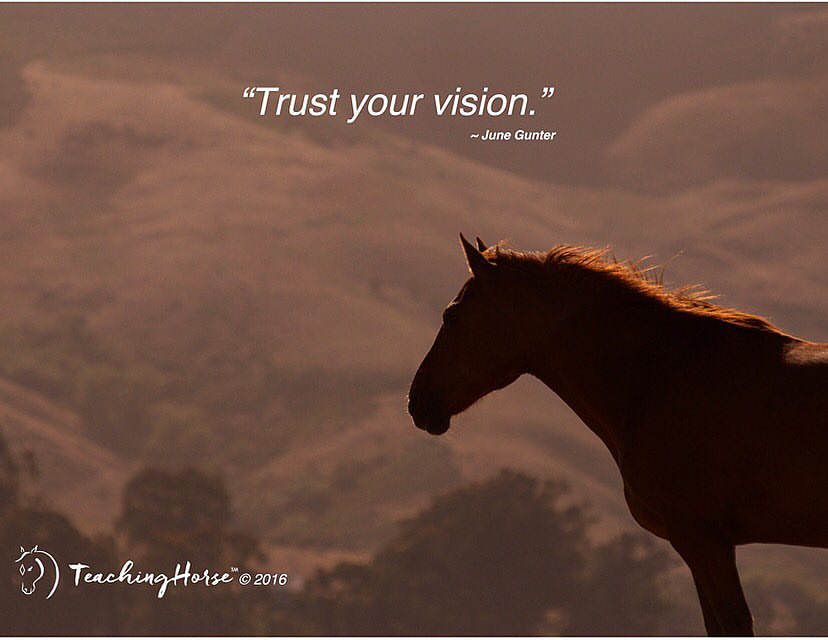
by Julia Felton | Oct 5, 2016
Good morning. Hope you are having a great week. This week I am just sending you a quick shot of Wednesday Wisdom inspiration as I’m in the south of France with very limited internet access, except for today when I’ve travelled to Amsterdam to co-deliver a workshop for Centre of Creative Leadership. I am beyond excited to be helping facilitate this workshop which we are running concurrently both in the US and Europe for a global client. This is an industry first as we all come together and collaborate under the Teaching Horse philosophy designed by my good friend June Gunter.
As I landed at Amsterdam this morning I was wondering what I would share with you this week, and then this great quote landed in my inbox from June and I simply knew this is what I had to share, “Trust Your Vision”.
In business we so often have to trust ourselves and others, and yet just as importantly we have to have trust and self-belief in what we want to accomplish. June has trust in us to deliver an awesome workshop for her company today. It is not something I take lightly and yet it has been made possible by the trust and relationship I have built with June over the last few years. Without June extending her trust to me and my colleagues her vision of simultaneous delivery of Equine Guided Leadership programmes across the world would not have been possible.
On a personal note I’m in the south of France this week participating in a Musketeer Academy. We have been transported back to 1624 and are training to learn the art of fencing. We are also riding horses into the medieval French castles in full Musketeer costumes and then fencing here. This whole experiential adventure has been made possible because Clinton Swaine, my mentor, trusted his vision that we could actually get permission to do this. Again something that had never been done before. And my fellow Musketeers trusted that Clinton could deliver on his vision, and so far it has not disappointed. I’ll share lots more about my adventures next week, I know the pictures will be amazing.
So, I’m curious to hear about what activities in your life and business will you have had to have unwavering trust in your vision to achieve. As always I’d love you to share in the Facebook group.
Wishing you an amazing week
Julia Felton (aka The Business Wrangler) is the founder of Business HorsePower. Business leaders, entrepreneurs and executives hire her to accelerate their business performance by harnessing the energy of their people to work more collaboratively together. By aligning purpose with actions the team achieves exponential results as everyone starts pulling in the same direction.
Julia believes that business is a force for good and through designing purpose-driven businesses that leverage the laws of nature, and the herd, you can create businesses founded on the principles of connection, collaboration and community that make a significant impact in the world.
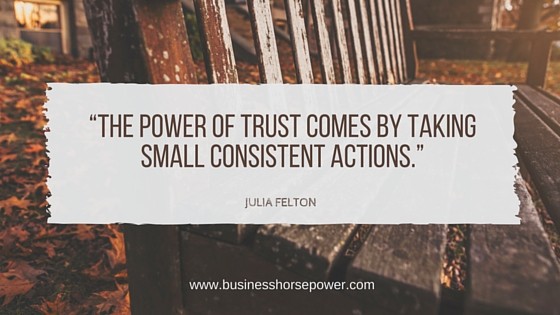
by Julia Felton | Jul 27, 2016
Today I want to talk about the importance of building trust with those you work with. Trust is that elusive quality that fundamentally impacts all aspects of our lives. It is easy to lose and difficult to gain but can be impacted by the power of small.
In his book The Speed of Trust, Stephen R. Covey describes the first wave of trust as self–trust. It is all about being credible and developing integrity, intent, capabilities and results that make you believable, both to yourself and others.
Building trust with yourself starts with the small things in life: doing what you say will do. For example, being on time to meet friends, not finding excuses for cancelling just because you don’t feel up to it, putting personal appointments in your diary and then making sure you keep them (e.g. going to the gym).
I know from my own experience how difficult it can sometimes be to keep those appointments with myself. It is so easy when the alarm goes off in the morning to find an excuse for not exercising today, or not getting up and writing my book. Over these last few months it has taken courage and determination for me to set aside time to start my running. Sure, there is always something else pressing to do, but I know that every time I fail to keep these commitments to myself I feel my self-esteem and self-confidence slipping away and I fail to inspire others to believe in me. They lose trust in me and
the net result is that my business suffers.
It is the small things we do that ultimately impact how people trust us. We might not realise it, but telling a white lie here and failing to keep an appointment there all impact our credibility. And if we are not credible then we are not trustworthy; people simply don’t believe that we will follow through on our actions. We lack integrity when we fail to keep our own standards, and when we fail to live up to our own standards our colleagues see no reason to meet them, either.
BUILDING TRUST WITH SMALL ACTION
Beaver Trees and Landscaping, a small company based in Christchurch New Zealand provides a perfect example of a company that has fully embraced the power of building trust by small actions. Given the nature of its business the company has many client appointments to quote for work.
So after hearing about the Power of Small from Paul Dunn of B1G1, the owner Bryce Robb implemented a policy of making all the appointments for quotations at unusual times, such as 10:25am. This was such a small change to the business but it had massive impact.
Firstly, customer’s surprise at the times of the appointments prompted them to be on time; they were then delighted when the Beaver Trees representative turned up on time. In fact, people are so surprised that they are often found waiting on their driveway for the representative. Now, of course, the Beaver Trees representative is always on time and just this simple act has built massive trust with prospective clients. The net result is that the company’s sales conversion rate has jumped to a massive 80% and they are not the cheapest game in town.
This proves the power of making a commitment and sticking to it. Furthermore, the company was recently judged to be the Best Company To Work For In the World with under 50 team members.
That’s the power of building trust by doing what you say you will do. That’s the power of small.
So what small action will you take today to start building trust with your team, stakeholders and customers? Let me know.
Julia Felton (aka The Business Wrangler) is the founder of Business HorsePower. Business leaders, entrepreneurs and executives hire her to accelerate their business performance by harnessing the energy of their people to work more collaboratively together. By aligning purpose with actions the team achieves exponential results as everyone starts pulling in the same direction.
Julia believes that business is a force for good and through designing purpose-driven businesses that leverage the laws of nature, and the herd, you can create businesses founded on the principles of connection, collaboration and community that make a significant impact in the world.
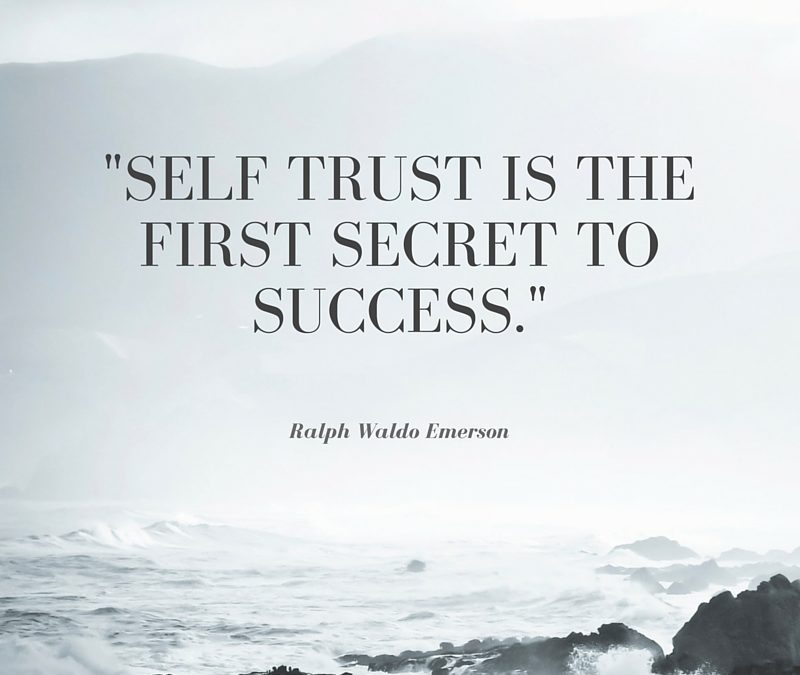
by Julia Felton | May 4, 2016
Recently I have been thinking a lot about trust and how it is a vial ingredient for success in both life and business. In my book The Alchemy Of Change I have two chapters dedicated to trust as it is the glue that holds everything together. Without trust business falters and without self trust we are unlikely to develop our true potential.
In The Speed of Trust, Stephen M..R. Covey identifies fives waves of trust and the first is self-trust. It is all about being credible and developing integrity, intent, capabilities and results that make you believable to both yourself and others. But how do you develop self-trust?
Building trust starts with the small things in life, like doing what you say you will do and keeping appointments with yourself. It might seem obvious but every time you fail to keep an appointment with yourself you are effectively saying that you are not important enough and something else is. In this way you start eroding your self confidence and your self worth.
Research has also shown that a person’s level of self-confidence impacts their performance. This is why Jack Welch felt so strongly that “Building self-confidence in others is a huge part of leadership”. Just think about it. If you don’t have any confidence your own abilities to do the job then you are unlikely to do a great job.
The classic example of this shows up in sales because if the sales person is not confident about the benefits of the service/product they are offering, they will not instill any confidence in the buyer that the product./service will meet their needs. And the end result is that no sale is made. Contrast this with the confident sales person who instinctively knows that their product/service will meet the buyers needs. Every fibre of their being knows this is the right solution for the buyer and invariably that translates into a sale. The buyer also just feels confident that the sales person knows what they are talking about and trusts that they will offer them the right solution.
So how as leaders do we build trust with others? It is by how we act. We need to continually demonstrate our credibility and integrity to others and keep our own standards, thereby acting as a mirror of how we want others to act.
So as you go about your week please think about how you can increase you own levels of self-trust so that you can be credible, inspiring and compelling to those around you and therefore elevate their level of trust in you. Trust me the results in your business will shift immeasurably when you are seen as a trusted adviser to your clients.
Julia Felton (aka The Business Wrangler) is the founder of Business HorsePower. Business leaders, entrepreneurs and executives hire her to accelerate their business performance by harnessing the energy of their people to work more collaboratively together. By aligning purpose with actions the team achieves exponential results as everyone starts pulling in the same direction.
Julia believes that business is a force for good and through designing purpose-driven businesses that leverage the laws of nature, and the herd, you can create businesses founded on the principles of connection, collaboration and community that make a significant impact in the world.
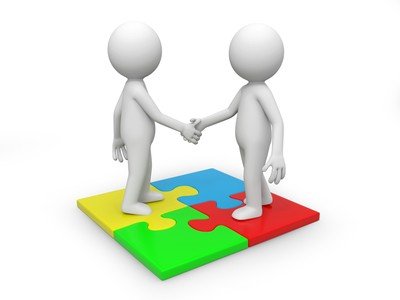
by Julia Felton | Jul 1, 2015
“We can build our leadership upon fear, obligation, or trust. However, only a foundation of trust results in the collaboration and goodwill necessary to achieve our peak performance.”
These words, from organizational design expert Roger Allen, could hardly be more succinct in expressing the central role that trust plays in building and leading high-performance organizations. What is also very apparent to me is that this same principle holds true in developing relationships with my horses. Sure I could intimidate my horse, or force him, but in my experience this might simply get short term gains. Developing a meaningful relationship means that we need to invest in developing trust. It’s not the quick fix that many of us are looking for nowadays but the rewards are truly worth it.
With the integrity of our business leaders under such a microscope these days, it’s valuable to take a moment for a refresher on trust in leadership. For integrity, though critical to trust, isn’t the only element of a trust-based management style. According to Seattle-based management expert Stephen Robbins, trust is based on four other distinct elements in your relationship with the people you lead:
- Competence. At first this may seem strange—after all, can’t incompetent people be trusted? Of course, but not if you want to lead. Leaders are held to a different standard, and part of what your team trusts is that you know what you’re doing. It comes with the territory.
- Consistency. This is one of the most pragmatic elements of trust. If your team knows what you stand for, then they will believe that you will react in a predictable way to certain situations. Over time your consistently expressed values become the shared values of the team. Some charismatic leaders may purposely act unpredictably to “shake things up,” and they may well be wildly successful. But they won’t necessarily be trusted.
- Loyalty. To a certain extent, your team can only trust you to the degree you are committed to their success and well-being. Max De Pree, the legendary CEO of Herman Miller and champion of the “servant leader” concept, puts it this way: “The leader’s first job is to define reality. The last is to say thank you. In between the leader must become a servant and a debtor.” This servant/debtor relationship to your team is one that strongly conveys your loyalty to them.
- Openness. Trust is ultimately the characteristic of a relationship, and it is through its relationship with you that your team expresses its trust. Openness is a cornerstone of the ability to build these relationships. If your team can’t get to know you, then they probably can’t get to trust you, either. With openness comes the requirement for a certain vulnerability: in this arena, you will generally have to “go first” by reaching out and creating such relationships.
By investing in building and strengthening these qualities in your leadership, you will be steadily reinforcing your trust relationship with the people who work for you. Those relationships, in turn, become the foundation for building a high-performance organization, particularly in times of change and stress, when people tend to rely upon their personal relationships. If your team trusts you in good times, they are even more likely to stand with you when the times turn challenging.
If you are interested in learning how to develop trust in your organisation to drive business performance then please connect with me to schedule an Unleash Your Profit Potential Strategy Session.
Julia Felton (aka The Business Wrangler) is the founder of Business HorsePower. Business leaders, entrepreneurs and executives hire her to accelerate their business performance by harnessing the energy of their people to work more collaboratively together. By aligning purpose with actions the team achieves exponential results as everyone starts pulling in the same direction.
Julia believes that business is a force for good and through designing purpose-driven businesses that leverage the laws of nature, and the herd, you can create businesses founded on the principles of connection, collaboration and community that make a significant impact in the world.

by Julia Felton | Apr 21, 2015
I was recently reading an article by Jim Rohn in which he said:
“Failure is not a single, cataclysmic event. We do not fail overnight. Failure is the inevitable result of an accumulation of poor thinking and poor choices. It is nothing more than a few errors in judgement repeated every day.
And failure’s most dangerous attribute is its subtlety. In the short term, small errors don’t seem to make any difference—we do not seem to be failing. In fact, sometimes these accumulated errors in judgement occur throughout a period of great joy and prosperity in our lives. Because there are no instant consequences to capture our attention, we simply drift from one day to the next, repeating errors, thinking the wrong thoughts, listening to the wrong voices and making the wrong choices. It is imperative to refine our philosophy in order to be able to make better choices.”
and it got me to thinking that relationships do not just disintegrate over night. They fall apart because of a consistent failure of communication.
Research studies tell us that 70% of workplace mistakes are a result of poor communication. Communication failures can be costly. It can cause loss of business, accidents, frustration, hostility, high employee turnover, low productivity and much more.
When we think about a failure in communication we often assume that two people have not spoken to each other about the issue. Maybe they have avoided having a conversation for fear of reprisals or have been afraid about how the other person will respond. However, communication is a two way street and it relies on:
- the ability to ask for what we want and
- the ability to really listen to what the other person needs.
Stephen Covey describes this ability to really listen to what the other person is saying as empathetic listening. It means listening with intent to really understand what is happening for the other person. Through empathic (from empathy) listening you can get inside another person’s frame of reference and see and experience the world through their eyes. This enables us to connect at a much deeper level.
However, empathetic listening is only possible when we are being truly authentic. When we are showing up as ourselves with no personal agenda and are open to hearing someone else’s point of view. Remaining authentic in our communication takes time and practice but impact is profound.
Julia Felton (aka The Business Wrangler) is the founder of Business HorsePower. Business leaders, entrepreneurs and executives hire her to accelerate their business performance by harnessing the energy of their people to work more collaboratively together. By aligning purpose with actions the team achieves exponential results as everyone starts pulling in the same direction.
Julia believes that business is a force for good and through designing purpose-driven businesses that leverage the laws of nature, and the herd, you can create businesses founded on the principles of connection, collaboration and community that make a significant impact in the world.

















